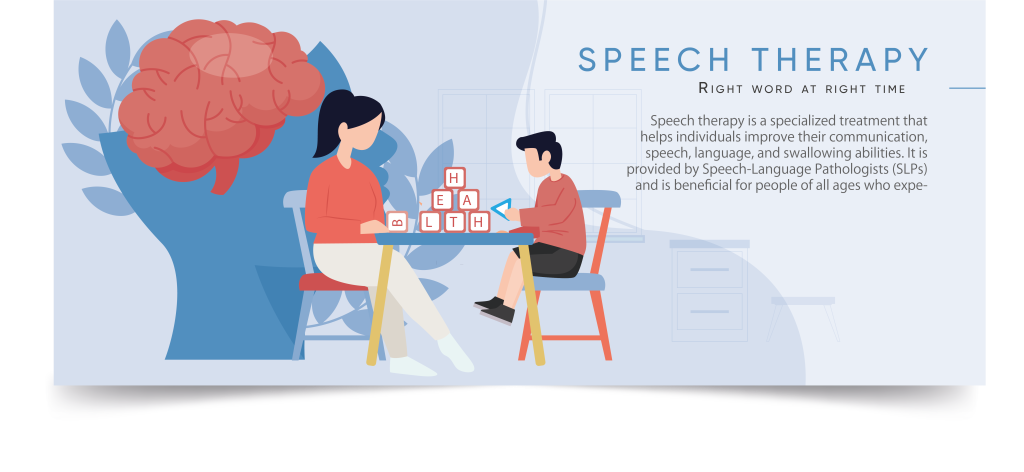Speech Therapy
Speech disorders include the following problems, according to the American Speech-
Language-Hearing Association (ASHA)
Speech-language therapy is the treatment for most kids with speech and/or language disorders. A
speech disorder refers to a problem with the actual production of sounds, whereas a language
disorder refers to a difficulty understanding or putting words together to communicate ideas.
Speech Disorders and Language Disorders
Speech disorders include the following problems, according to the American Speech-
Language-Hearing Association (ASHA):
° Articulation disorders include difficulties producing sounds in syllables or saying words
incorrectly to the point that other people can’t understand what’s being said.
° Fluency disorders include problems such as stuttering, the condition in which the flow of
speech is interrupted by abnormal stoppages, repetitions (st-st-stuttering), or prolonging
sounds and syllables (ssssstuttering). Resonance or voice disorders include problems with
the pitch, volume, or quality of the voice that distract listeners from what’s being said.
These types of disorders may also cause pain or discomfort for the child when speaking.
° Dysphagia/oral feeding disorders, including difficulties with eating and swallowing.
Language disorders can be either receptive or expressive:
° Receptive disorders refer to difficulties understanding or processing language.
° Expressive disorders include difficulty putting words together, limited vocabulary, or
inability to use language in a socially appropriate way.

Specialists in Speech-Language Therapy
Speech-language pathologists (SLPs), often informally known as speech therapists, are
professionals educated in the study of human communication, its development, and its disorders.
They hold at least a master’s degree and state certification/licensure in the field, as well as a
certificate of clinical competency from ASHA.
By assessing the speech, language, cognitive-communication, and swallowing skills of children
and adults, speech-language pathologists can identify types of communication problems and the
best way to treat them.
SLPs treat problems in the areas of articulation; dysfluency; oral-motor, speech, and voice; and
receptive and expressive language disorders.
Remediation
In speech-language therapy, an SLP will work with a child one-to-one, in a small group, or
directly in a classroom to overcome difficulties involved with a specific disorder.
Therapists use a variety of strategies, including:
° Language intervention activities – In these exercises an SLP will interact with a child by
playing and talking. The therapist may use pictures, books, objects, or ongoing events to
stimulate language development. The therapist may also model correct pronunciation and
use repetition exercises to build speech and language skills.
° Articulation therapy – Articulation, or sound production, exercises involve having the
therapist model correct sounds and syllables for a child, often during play activities. The
level of play is age-appropriate and related to the child’s specific needs. The SLP will
physically show the child how to make certain sounds, such as the “r” sound, and may
demonstrate how to move the tongue to produce specific sounds.
° Oral motor/feeding therapy – The SLP will use a variety of oral exercises, including
facial massage and various tongue, lip, and jaw exercises, to strengthen the muscles of
the mouth. The SLP may also work with different food textures and temperatures to
increase a child’s oral awareness during eating and swallowing.
° The Clinic offers speech-language pathology services for all ages. Thorough
evaluation and treatment is provided for a variety of conditions and disorders
including:
Speech Therapist treat following problems:
°Articulation Disorders
°Oral-Motor Disorders
°Developmental Language Delay
°Learning Disabilities
°Fluency Disorders including Stuttering
Voice Disorders
°Aphasia and dysarthria resulting from stroke or other neurogenic conditions
°Parksinson’s Disease (Lee Silverman Voice Treatment-LSVT)
°Dysphagia or swallowing disorders
°Memory and cognitive decline secondary to head, injury, stroke, dementias and
°Alzheimer’s
°Accent Reduction and communication enhancement


